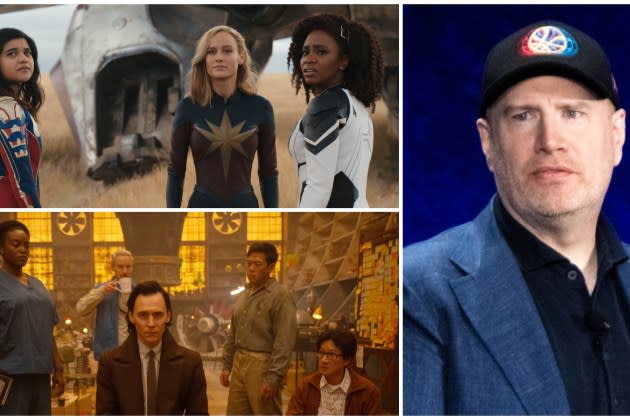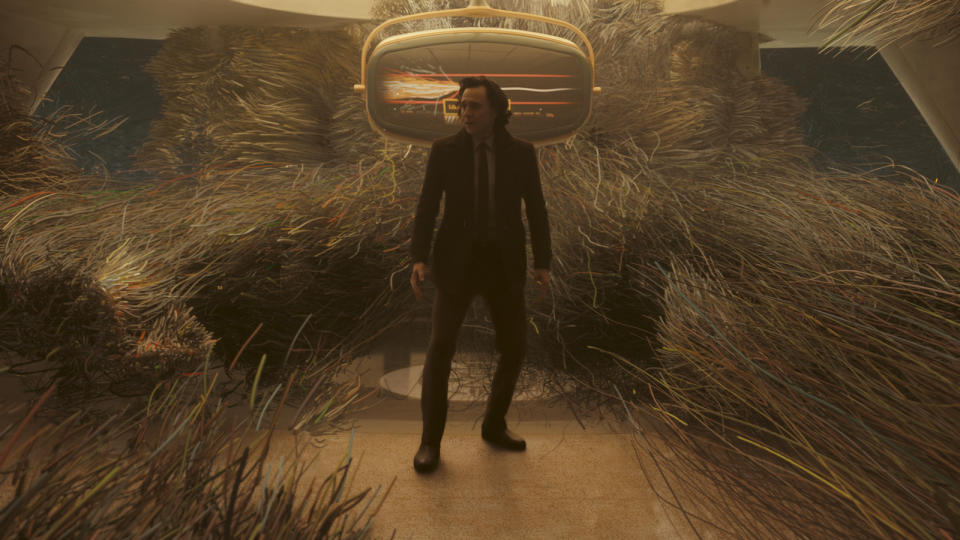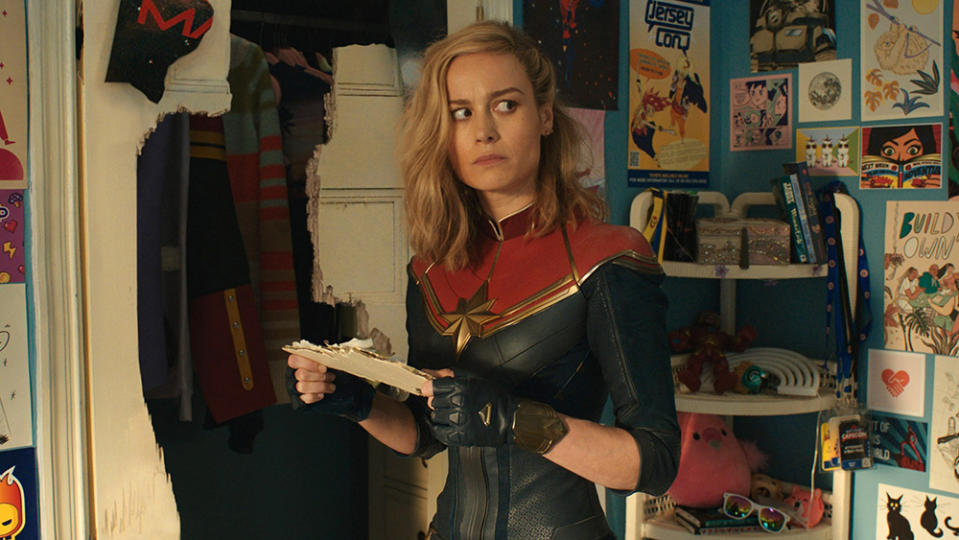To Save the MCU, Marvel Needs to Destroy It — or Maybe Just Make More Things Like ‘Loki’

SPOILER ALERT: This story discusses major plot developments in Season 2, Episode 6 of “Loki,” currently streaming on Disney+, and “The Marvels,” currently playing in theaters.
For the past few months, I’ve been talking with some of my friends and colleagues about a radical idea that’s been bouncing around in my head that I haven’t been able to shake: The only way Marvel Studios can save the MCU is to destroy it.
More from Variety
How the 'BlackBerry' Creative Team Expanded Their Film Into a Limited TV Series
After 'The Marvels' Bombs at the Box Office, What's Next for the MCU?
It’s become something of a national pastime of late to obsess over the perceived unraveling of the Marvel Cinematic Universe. The box office failure of “The Marvels” — which just suffered through the worst opening weekend in the MCU’s history — is simply the latest indignity. For the past two years, media outlets across the internet (including, and perhaps especially, the one you’re currently reading) have covered with relentless detail all the creative missteps, internal conflicts, external scandals, and outright failures that have bedeviled Marvel Studios, while fans have flooded onto social media to debate and dispute when, how, why and whether Marvel lost its way.
This matters, of course, because, for over a decade, Marvel Studios was popular in a way nothing in Hollywood has ever been popular before — and now, suddenly, it isn’t, at least not nearly at the scale it used to be. For some, it feels like a genuine loss. For others, it’s a source of endless fascination and debate. And then there are those who are relieved by the prospect that maybe, just maybe, the culture won’t be dominated by superheroes anymore.
Personally, I’ve felt each of those feelings at one time or another. My beat at Variety is genre entertainment; it’s basically my job to ruminate on the fate of the MCU, as both a storytelling entity and a commercial enterprise. And lately, I’d become convinced that Marvel can only right both its creative and financial prospects by nuking the MCU and restarting with a brand-new timeline built around the X-Men and the Fantastic Four, the two beloved Marvel Comics properties that had eluded the MCU until Disney purchased 21st Century Fox in 2019. No, audiences aren’t ready to see new actors as Iron Man or Captain America, but the breathless speculation that Daniel Radcliffe was getting buff to play Wolverine (he wasn’t) tells me that audiences are ready to get excited for a new Storm, a new Prof. X, and a new Magneto. And just ask John Krasinski and Emily Blunt if the public is interested in who will play the new Fantastic Four.
Yes, this is a crazy idea. No, I do not expect Marvel to listen. But by way of explaining myself, let me first sing the praises of what is, to my eyes, one of the very best things Marvel has ever done: “Loki.”
Over its two seasons, Loki, the character — played with astonishing commitment and sensitivity by Tom Hiddleston — has undergone a journey of self-discovery that few characters in fiction, let alone the MCU, ever enjoy. Head writers Michael Waldron (for Season 1) and Eric Martin (for Season 2), in partnership with lead directors Kate Herron (Season 1) and Justin Benson and Aaron Moorhead (Season 2), have deconstructed Loki as both an archetype of villainy and a flesh-and-blood person who just happens to be a god. They don’t quite tear Loki down so much as strip away everything he knows about himself and the universe he so deeply desires to rule so they can credibly build him back up into a genuine hero.

On Season 2, the vast metaphysical bureaucracy of the Time Variance Authority — which Loki has come to think of as his second home — becomes catastrophically overburdened by the multiverse, placing everyone Loki has come to hold dear in existential peril. For the first time in his life, he has friends, and Hiddleston allows the fact of that to melt Loki’s diamond-hard cynicism into a profound sense of connection (if still filtered through his own ego). In the penultimate episode of Season 2, while having a drink with Sylvie (Sophia Di Martino) — the closest person to a soulmate that Loki has ever had — Loki stumbles into a tearful confession: “I want my friends back. I don’t want to be alone. … Without them, where do I belong?”
To prevent the TVA — and the multiverse itself — from becoming obliterated forever, Loki strives to master his newfound ability to slip backwards and forwards through time. He does this over and over and over, for centuries, refusing to accept what appears to be plainly obvious (and here we return to my harebrained idea): The only way for him to save the TVA is to destroy Sylvie.
Loki refuses to accept that option. Sylvie has become far too meaningful to him; he cannot accept wiping her from existence. So instead, he sacrifices himself. He transforms from the god of mischief into the god of stories, banishing himself to the end of time so he can bind every strand of the multiverse together to keep them in harmony. By doing so, Loki finally sits atop the ultimate throne, achieving the glorious purpose he’d yearned for all his life. But he’s also utterly, unalterably alone.
It’s a stunning and profound ending that manages to harness the multiverse (in Loki’s case, quite literally) while never once feeling beholden to it. And yet, watching the finale, it was hard not to imagine Marvel Studios’ own god of stories — that would be studio chief Kevin Feige — contending with an increasingly impossible tangle of narrative possibility, clinging onto each strand, willing them to all work together.
At the Las Vegas premiere of “The Marvels,” Feige told “Entertainment Tonight” that “everything is a building block in the broader story — that’s just part of the fun.” But is it anymore? While following a grand, sustained meta-narrative across several individual movie franchises was once delightful and thrilling, the MCU now feels closer pop-culture homework.
Take “The Marvels.” As a movie, it is often good fun, and Iman Vellani’s performance as Kamala Khan (aka Ms. Marvel) is an endless delight. But to fully appreciate the movie’s story, you need to have seen 2019’s “Captain Marvel” and “Avengers: Endgame” in theaters, and then watched 2021’s “WandaVision” and “Hawkeye,” and 2022’s “Ms. Marvel” on Disney+. The movie strains under the weight of having to service all of these storylines while also pretending like you don’t have to have seen any of them to understand the movie, when — as audiences clearly believed — you really do.
“Think about those first acts of those initial Marvel movies,” one award-winning genre TV writer said to me. “They work! You care about your protagonists. You’re not concerned with setting up fifteen other movies or teasing some grand mythology. Those first MacGuffins — the Tesseract, Infinity Stones — were just that. They didn’t overwhelm those first movies.”

The barrier to entry has become needlessly convoluted and intimidating, the same predicament that caused Marvel comics to shrink from a mainstream phenomenon to servicing a relatively insular subculture. Which is totally fine! But comics don’t require hundreds of artists and hundreds of millions of dollars to create the illusion of a billionaire playboy with a cutting-edge metal suit. Movies aren’t comics. So why does Marvel Studios have to race headlong into the same narrative cul-du-sac that the comics did?
As a different TV and comic book writer put it to me recently, “The MCU has become Marvel [comics] in the aughts: Too many books, too many characters. They need to get small. I don’t give a shit about the Kang Dynasty because I don’t care about Kang. Or the multiverse. They haven’t made it emotional.”
The interconnectivity of the MCU has also grown so tangled, spurred by an insatiable push for Disney+ content, that it has made it particularly vulnerable to disruption. At one point, the Disney+ series “Secret Invasion,” focusing on Samuel L. Jackson’s Nick Fury, was supposed to follow the events of “The Marvels,” but then creative issues with the movie caused Marvel to move its debut to several months after “Secret Invasion.” As anyone who watched the show can tell you, it suffered — so much so, that even though Fury plays a significant role in “The Marvels,” the movie contains zero mention of what happened in “Secret Invasion.”
Meanwhile, Jonathan Majors — the actor hired to play dozens of versions of the villain Kang across several MCU projects, including 2026’s “Avengers: Kang Dynasty” — is still awaiting trial for his arrest in March for assaulting his now-former girlfriend, a media saga that has made headlines all year. (Majors has denied all charges.) Variety recently reported that at a Marvel retreat in September, executives discussed the possibility of replacing Kang with a different villain, upending years of creative effort and sunk costs.
Marvel has taken some less drastic steps to address these problems recently, but they come off as half measures. The studio recently announced a new “Spotlight” banner for titles that don’t have “larger MCU continuity” — but the Disney+ and Hulu series launching this banner, “Echo,” was created to be a spin-off of “Hawkeye,” which only adds confusion instead of clarity. As recently as Thursday, Disney has also pushed several Marvel titles originally announced for 2023 into 2024 and 2025. But that’s largely due to the writers and actors strikes, and while Marvel now only has one feature film set to open in 2024, there are four movies currently slated for 2025.
Two of those films, “Thunderbolts” and “Blade,” have now leapfrogged “Fantastic Four” on Marvel’s slate after initially being scheduled to open before it — which wouldn’t be a problem if those movies weren’t, in Feige’s words, “a building block in the broader story.” Just about every creative problem Marvel is currently facing could be resolved if its movies didn’t have to service the MCU.
To be fair, there have been signs that Marvel is already heading towards a reboot of some kind. Mutants have been trickling into the MCU, first with Patrick Stewart’s cameo as Professor X in “Doctor Strange in the Multiverse of Madness,” then with the revelation that Kamala Khan’s powers are from a genetic mutation. The post-credits scene in “The Marvels” features Kelsey Grammer as the X-Men scientist, Beast, and at least some of the X-Men are expected to appear in “Deadpool 3” — which we already know will star Hugh Jackman as Wolverine. The Multiverse Saga itself is set to conclude with “Avengers: Secret Wars,” which shares a title with a 2015 comic book series that did, in fact, wind up quasi-rebooting the Marvel comics universe.
That movie, however, isn’t slated to premiere until May 2027 — an eternity for a franchise that is in decline.
But if abandoning the most lucrative creative endeavor ever produced in Hollywood isn’t in the cards, then allow me to make another wildly presumptuous suggestion: Make more projects like “Loki.” You needn’t have seen any Marvel title since “Endgame” to grasp the show; instead, it asks its audience to invest in its characters far more than anticipate how it may relate to a larger universe. “Loki’s” universe is more than enough, and audiences are responding. After this story originally posted, Disney announced that the Season 2 finale had earned 11.2 million views in its first three days, up from the 10.9 million views for the season premiere in the same time frame. According to the studio, it’s the second best viewed season finale in 2023, behind just the Season 3 conclusion of “The Mandalorian.”
Perhaps all Feige needs to do is let go of those strands and let them develop on their own. Maybe the best way to save the MCU isn’t to kill it, but just to set it free.
Best of Variety
Sign up for Variety’s Newsletter. For the latest news, follow us on Facebook, Twitter, and Instagram.

 Yahoo News
Yahoo News 
